
7 Creative Ways to Learn About People Who Work in the Morgue
Why Understanding Morgue Careers Matters More Than You Think
People who work in the morgue represent a diverse group of professionals who ensure dignity in death while advancing forensic science. Understanding their roles helps explain an essential but often misunderstood field.
Key Professionals in Morgue Settings:
- Forensic Pathologists - Medical doctors who determine cause of death ($211,390 median salary)
- Morgue Technicians/Dieners - Assist with autopsies and body preparation ($35,000-$50,000 annually)
- Coroners - Investigate deaths and file certificates (legally trained, not always medical)
- Forensic Science Technicians - Collect evidence and process samples ($57,850 median pay)
- Mortuary Assistants - Handle body care and family coordination ($32,850 average)
- Embalmers - Preserve bodies for viewing ($42,260 median salary)
- Administrative Staff - Manage records and coordinate with families
The morgue industry is growing rapidly - forensic science roles are projected to increase by 17% through 2026. Yet many people remain curious about what actually happens behind those doors.
As one morgue attendant shared in a recent Reddit AMA: "I entered the death industry and just never left. I love it so much as I have a purpose now: looking after those who have died."
Learning about these careers helps us appreciate the blend of science, compassion, and technical skill required. Whether you're considering a career change or simply curious about forensic work, understanding morgue operations provides valuable insight into how society handles death with dignity.
I'm Mortuary Cooler, and I've spent years working with funeral homes and morgues nationwide as a mortuary cooler supplier, giving me unique insight into the daily operations and the dedicated people who work in the morgue.
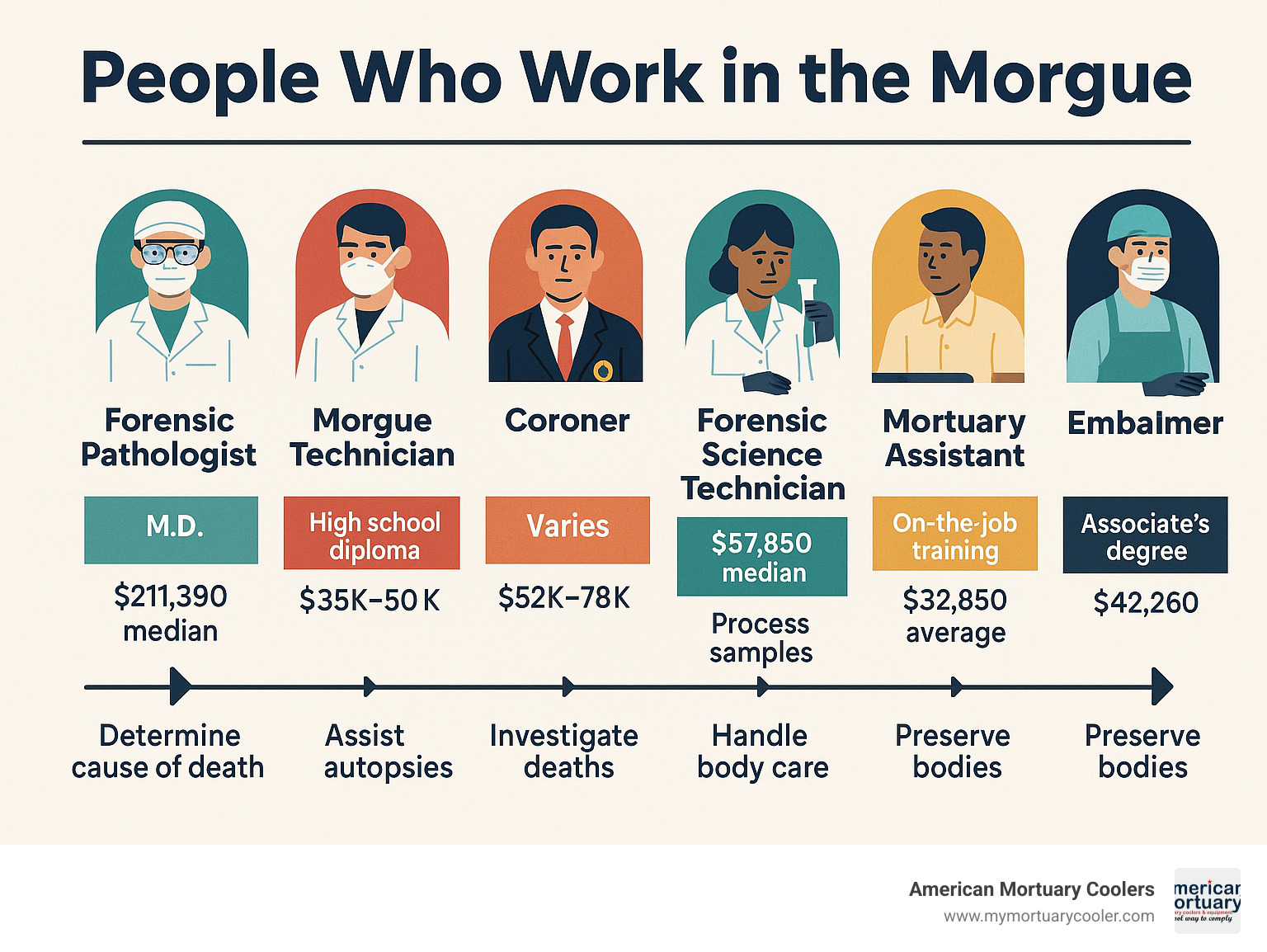
Similar topics to people who work in the morgue:
Step Inside the Mortuary: Tours, Shadowing & Virtual Walk-Throughs
If you've ever wondered what it's really like where people who work in the morgue spend their days, you're not alone. The best way to understand this professional environment is to see it - and there are more opportunities than you might think.
Many medical examiner offices and forensic institutes welcome visitors through educational tours. These aren't spooky haunted house experiences - they're professional, respectful glimpses into a controlled scientific environment. Students, career changers, and curious community members can often arrange visits to see how death investigations actually work.
Virtual reality has completely changed how we can explore morgue facilities. Several medical schools now offer incredible 360-degree virtual tours of their autopsy suites. You can walk through the space, see the equipment up close, and understand the workflow - all from your computer.
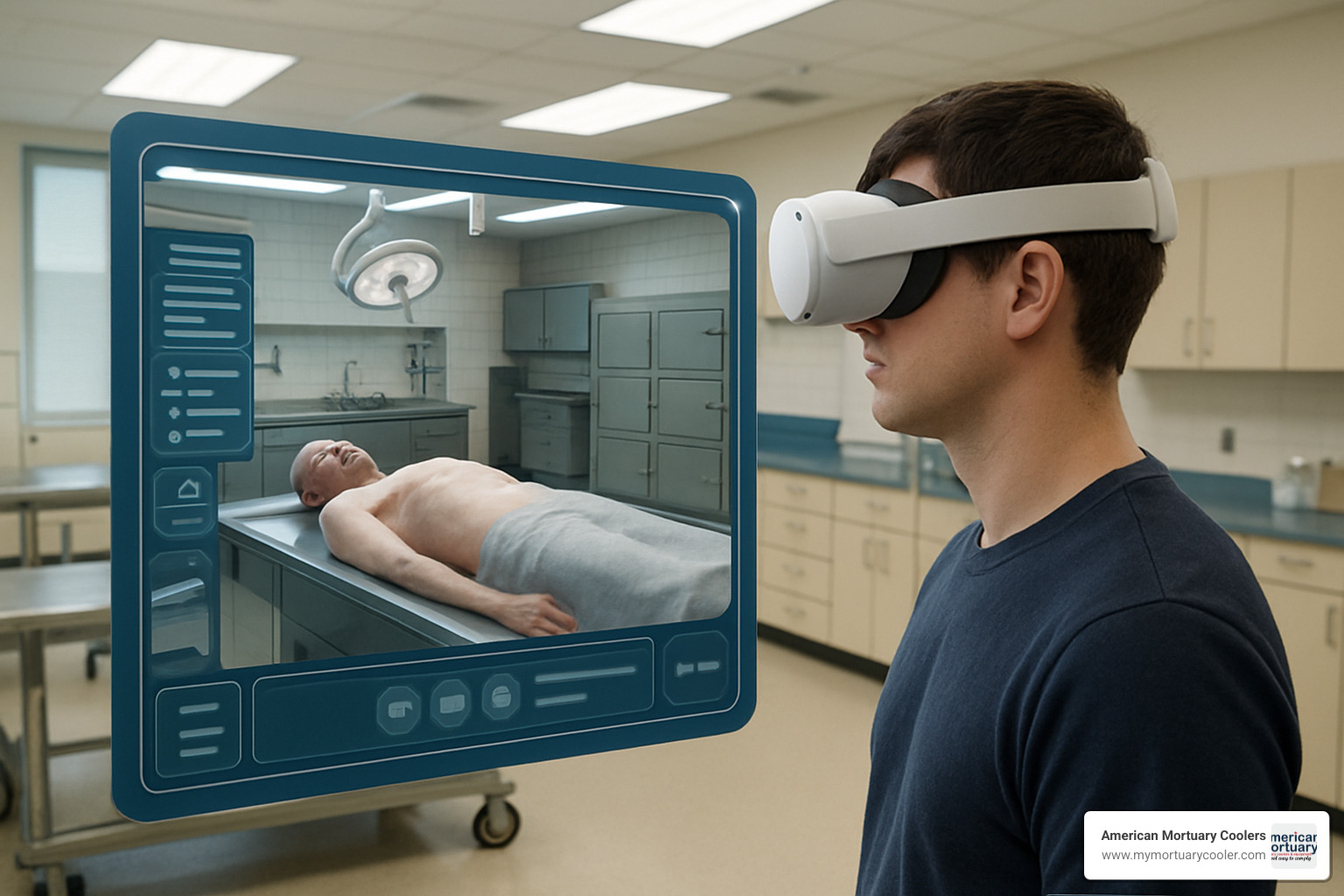
Job shadowing remains the gold standard for truly understanding morgue careers. Most medical examiner offices offer internships lasting one to two years. These programs give you hands-on experience with autopsy procedures, evidence collection, and family interactions. You'll need to sign confidentiality agreements and complete safety training before stepping foot inside.
When you do visit a morgue, proper etiquette matters tremendously. The atmosphere is professional and focused, nothing like the dramatic TV portrayals. You'll wear full personal protective equipment, maintain respectful silence during procedures, and follow strict protocols around body handling and evidence preservation.
Who Are the People Who Work in the Morgue?
Understanding who works in these facilities helps you see how everything fits together. People who work in the morgue form a carefully coordinated team, and each role requires different skills and training.
Forensic pathologists lead the medical side of operations. These doctors need an MD or DO degree plus specialized forensic training. They perform autopsies, determine how and why someone died, and testify in court when needed. With median salaries around $211,390, they're the highest-paid professionals in morgue settings.
Morgue technicians (sometimes called dieners) handle the hands-on work. They move and position bodies, assist during autopsies, collect specimens, and maintain all the equipment. These dedicated professionals earn between $35,000-$50,000 annually and typically need a high school diploma plus extensive on-the-job training.
Coroners investigate deaths and file death certificates. Unlike pathologists, coroners are legally trained officials who don't necessarily have medical backgrounds. They coordinate with police, families, and medical professionals to decide when autopsies are necessary.
Forensic science technicians focus on evidence and laboratory work. They process DNA samples, analyze trace evidence, and maintain that crucial chain-of-custody documentation that makes or breaks legal cases. This field is booming with 17% projected job growth.
Autopsy Safety Basics
Working in a morgue involves serious health and safety considerations that might surprise you. Scientific research on autopsy safety identifies six major hazard categories: mechanical injuries, sharp force accidents, electrical hazards, chemical exposure, radiation risks, and infection control.
Personal protective equipment is non-negotiable. Workers wear disposable gowns, gloves, eye protection, and respiratory masks for every procedure. Many facilities require double-gloving and face shields when handling decomposed remains or suspected infectious cases.
Sharp force injuries happen more often than you'd think. Autopsy procedures involve scalpels, bone saws, and other cutting instruments that demand respect. Technicians receive extensive training in safe handling techniques and know exactly what to do if someone gets accidentally cut or stuck.
Learn the Science: Degrees, Workshops & Certifications
Getting the right education is your first step toward understanding people who work in the morgue. The good news? There are multiple paths to enter this field, depending on which role interests you most.
Mortuary science programs form the backbone of death-care education. These comprehensive courses blend anatomy, pathology, chemistry, and even business management. You'll learn everything from body preservation techniques to grief counseling skills. More info about mortuary science degrees breaks down your options in detail.
The educational requirements vary dramatically based on your chosen career path. Forensic pathologists need the most extensive training - we're talking 8-12 years including medical school and specialized residency programs. They study medicine, pathology, and forensic investigation techniques.
On the other hand, morgue technicians can enter the field with just a high school diploma plus specialized certification programs. These typically last 6 months to 2 years and focus on anatomy, laboratory procedures, and safety protocols.
| Position | Education Level | Typical Duration | Key Subjects |
|---|---|---|---|
| Forensic Pathologist | Medical Degree + Residency | 8-12 years | Medicine, Pathology, Forensics |
| Morgue Technician | High School + Certificate | 6 months - 2 years | Anatomy, Lab Procedures |
| Forensic Scientist | Bachelor's Degree | 4 years | Chemistry, Biology, Physics |
| Mortuary Assistant | Associate's Degree | 2 years | Mortuary Science, Business |
| Embalmer | Certificate + License | 1-2 years | Embalming, Restoration |
Anatomy laboratories provide some of the most valuable hands-on experience. Many medical schools welcome mortuary science students into their cadaver dissection courses. This might sound intimidating, but it's essential preparation. Working with human remains in a controlled, educational setting helps future people who work in the morgue develop both technical skills and emotional resilience.
APT technician courses and OSHA training ensure workplace safety. These programs teach proper handling of biohazardous materials, chemical safety, and emergency procedures. Most employers require this certification before you can step foot in their facility.
Embalming labs offer specialized training in body preservation techniques. Students learn arterial injection, cavity treatment, and cosmetic restoration. It's detailed work that requires both scientific knowledge and artistic skill.
The learning doesn't stop after graduation. Continuing education requirements keep professionals current with new techniques and regulations. Embalmers typically need annual training hours to maintain their licenses. Forensic technicians often pursue additional certifications in DNA analysis, toxicology, or crime scene investigation.
Scholarships are surprisingly common in this field. The American Board of Funeral Service Education offers financial assistance specifically for death-care students. Many programs recognize that these essential services need qualified professionals, so they make education more accessible.
Connect Online: Social Media, AMAs & Podcasts
The internet has opened up a whole new world for anyone curious about people who work in the morgue. Gone are the days when these professionals worked in complete secrecy - now you can connect with them directly through social media, online forums, and educational content.
Caitlin Doughty has become something of a celebrity in the death care world. This mortician and author uses YouTube and social media to teach people about what really happens in funeral homes and morgues. Her approach mixes genuine education with just enough humor to make difficult topics approachable.
On Instagram, you'll find accounts like @4n6doctora where forensic professionals share glimpses of their daily work. They're careful to respect privacy and maintain professionalism, but they'll show you the science equipment they use or explain how they approach a challenging case.
Reddit AMAs (Ask Me Anything sessions) have produced some of the most honest conversations about morgue work you'll find anywhere. The anonymous format lets professionals share things they might never discuss at a dinner party. One morgue technician recently explained how they got started in the field: "I was just looking for steady work, but I found I genuinely care about helping families during their worst moments."
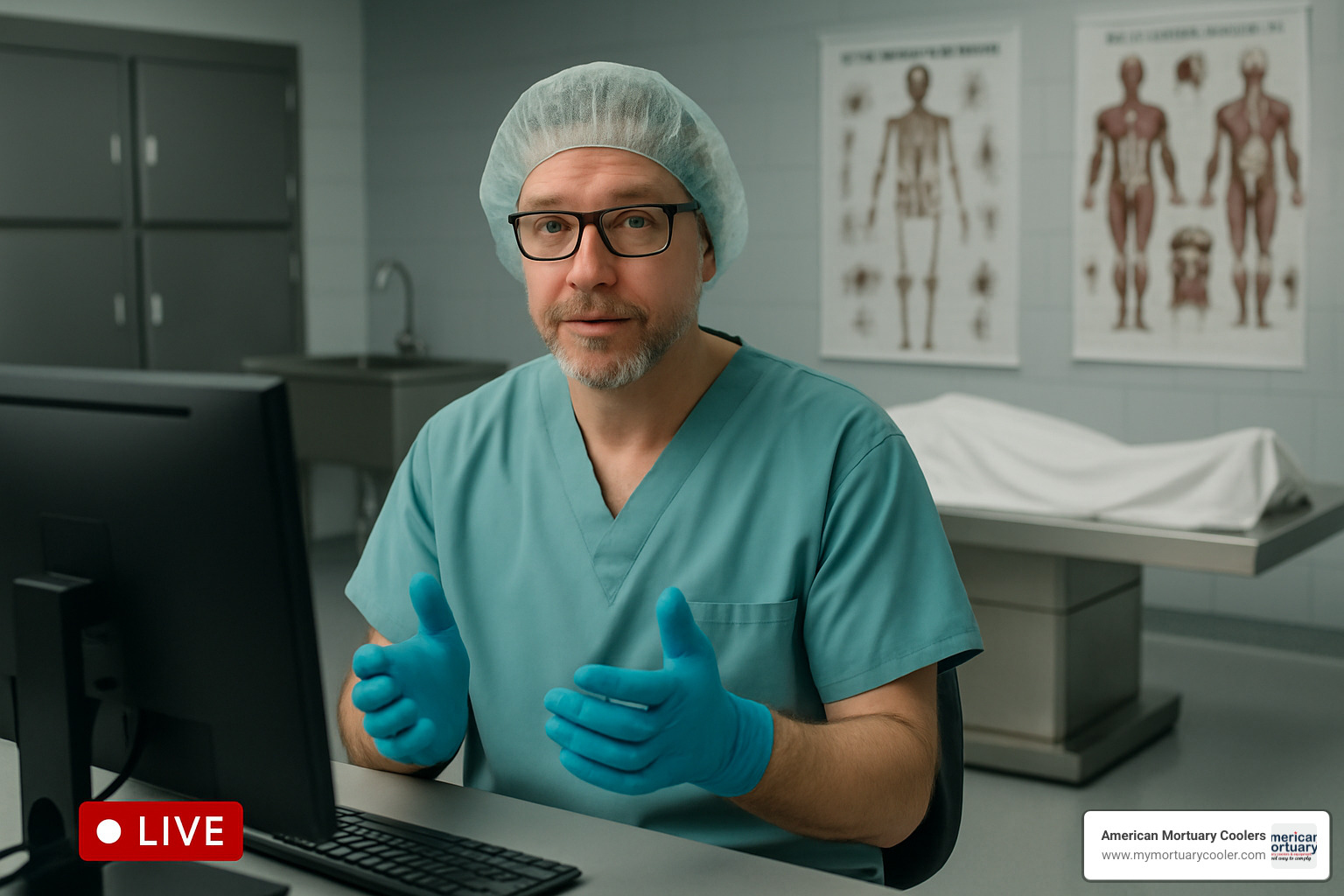
Professional forums create safe spaces where morgue workers can ask questions, share job opportunities, and support each other through tough cases. These communities understand the unique challenges that come with death care work.
You might be surprised to learn that morgue memes are actually a thing. Dark humor helps these professionals cope with the emotional weight of their jobs. As one pathologist put it: "Laughing doesn't mean we don't take our work seriously - it means we're human beings processing some pretty heavy stuff."
Daily Life of People Who Work in the Morgue
What does a typical day actually look like for people who work in the morgue? The reality is much more routine and professional than most people imagine, though it comes with unique challenges that other jobs don't have.
Most morgue workers follow shift patterns that include being on call for emergencies. A typical schedule might involve 12-hour shifts with overnight call responsibilities. When someone dies unexpectedly at a hospital or in the community, morgue staff need to be ready to respond quickly and professionally.
The day usually starts with reviewing any cases that came in overnight and coordinating with pathologists about the autopsy schedule. Equipment preparation takes up a significant portion of the morning - checking that mortuary coolers are maintaining proper temperatures, sterilizing instruments, and making sure all the necessary supplies are stocked and ready.
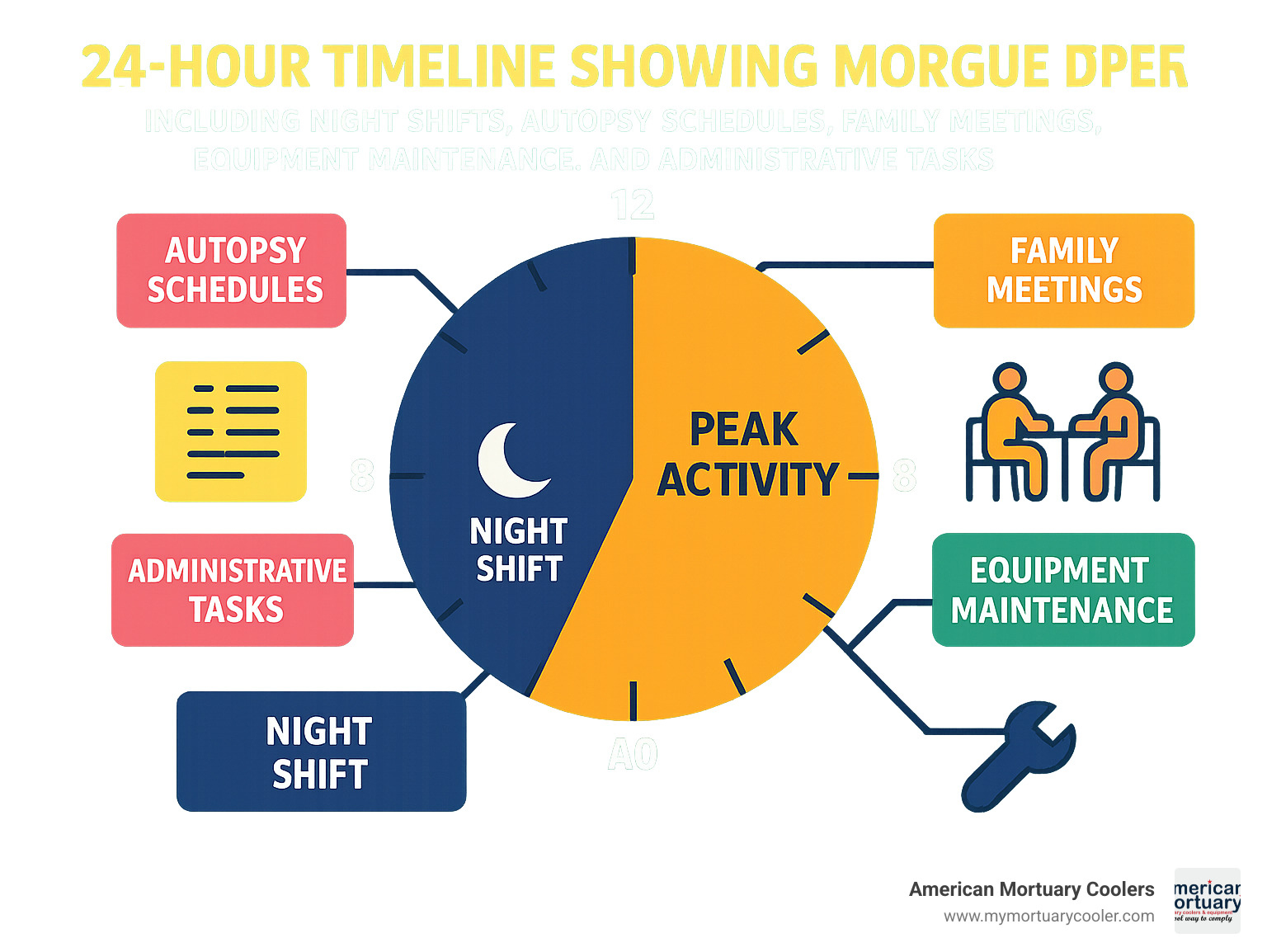
Family liaison work represents one of the most important but emotionally demanding aspects of the job. Morgue staff often serve as the first point of contact for grieving families. They explain procedures, answer questions about what happens next, and provide support during one of the most difficult times in people's lives.
The work demands incredible emotional resilience. Dealing with tragic cases - especially those involving children or violent deaths - takes a psychological toll that most other professions never face. Many facilities now provide grief counseling and peer support programs because they recognize how important it is to help their staff process these experiences.
Gear & Gadgets Behind the Scenes
The equipment that people who work in the morgue use every day is more sophisticated than most people realize. More info about essential morgue equipment covers the full range of tools and technology that make modern morgue operations possible.
Mortuary coolers form the backbone of any morgue operation. These specialized refrigeration units maintain bodies at precisely 36-39°F to slow decomposition while families make arrangements. They range from compact units that hold one or two individuals to large walk-in coolers that can accommodate multiple cases.
Autopsy tables represent some of the most specialized furniture you'll ever see. Modern tables include built-in drainage systems, integrated scales, and adjustable heights to accommodate different procedures. Many newer models feature photography systems and evidence collection stations that help streamline the entire examination process.
The cutting instruments used in autopsies - bone saws, rib cutters, and specialized dissection tools - require regular maintenance and careful sterilization between cases. These aren't the kind of tools you can pick up at a hardware store. They're precision instruments designed specifically for forensic and medical examination work.
Get Involved: Volunteering, Conferences & Entry-Level Jobs
Getting your feet wet in the morgue world doesn't require jumping straight into a full-time career. There are plenty of ways to explore what people who work in the morgue actually do, and many of these opportunities might surprise you with how accessible they are.
Body donation programs at medical schools offer some of the most meaningful volunteer opportunities. These programs need compassionate people to help coordinate educational programs and support families through the donation process. You'll gain exposure to anatomical education and death-care procedures while providing genuine service to grieving families.
Medical examiner internships provide structured learning experiences that can change your entire career trajectory. Scientific research on career opportunities shows these positions typically last 6-12 months and offer hands-on training in autopsy assistance, evidence handling, and laboratory procedures. Many current forensic professionals started exactly this way.
The conference circuit offers incredible networking opportunities. Death-care trade shows and forensic conferences bring together people who work in the morgue from across the country. You'll find equipment demonstrations, educational seminars, and career fairs where you can actually talk to professionals about their daily experiences.
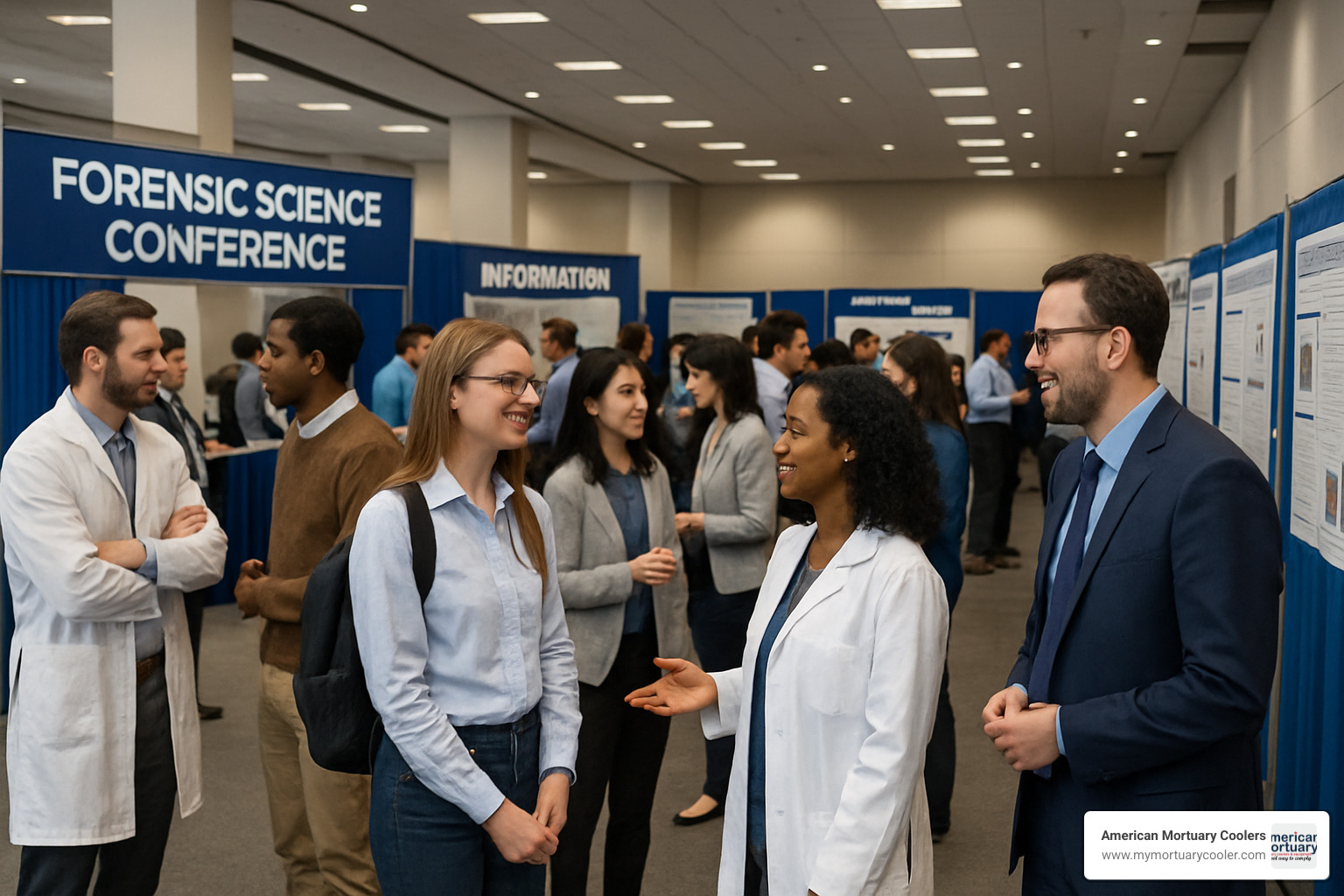
Entry-level positions in morgue settings are more accessible than most people realize. Many morgue technicians start as hospital orderlies or funeral home assistants before transitioning to forensic work. The key isn't having perfect credentials - it's demonstrating reliability, professionalism, and genuine interest in serving families during difficult times.
Here's something most people don't know: cruise ship morgues represent a unique career path. Most major cruise lines maintain small refrigerated morgues and employ professionals familiar with mortuary procedures and maritime law. These positions combine travel opportunities with specialized death-care responsibilities.
When preparing your resume for morgue careers, focus on relevant laboratory experience, attention to detail, and your ability to work in emotionally challenging environments. Volunteer work with hospice organizations, medical facilities, or funeral homes demonstrates your commitment to death-care services. Employers in this field value compassion and stability over flashy credentials.
Frequently Asked Questions about Morgue Careers
What skills matter most?
The most successful people who work in the morgue share a fascinating blend of technical precision and genuine compassion. Above all else, attention to detail becomes absolutely critical - one small documentation error can derail a legal case or cause unnecessary pain for a grieving family.
Physical stamina matters more than most people realize. Morgue work involves lifting and positioning bodies, sometimes for hours at a time during complex autopsies. Many professionals compare it to other physically demanding healthcare roles, requiring both strength and endurance.
Emotional resilience separates those who thrive from those who struggle in morgue careers. As one veteran technician shared with me: "I learned to use the mantra 'It's not my grief' to maintain professional boundaries while still providing compassionate care to families."
Communication skills prove essential since morgue workers often serve as bridges between families, law enforcement, and medical professionals. The ability to explain complex procedures in simple terms while showing genuine empathy can make all the difference during someone's worst day.
How do salaries vary by role?
Compensation for people who work in the morgue varies dramatically based on education level, experience, and geographic location. The salary ranges might surprise you - this field offers genuine career advancement opportunities.
Forensic pathologists top the pay scale at $211,390 median annually, reflecting their extensive medical training and legal responsibilities. These professionals have invested 8-12 years in education and specialized training, making them the highest-paid members of morgue teams.
Forensic science technicians earn a solid $57,850 median salary with exceptional job growth prospects of 17% through 2026. This represents one of the fastest-growing career paths in the death-care industry.
Embalmers average $42,260 annually, while mortuary assistants earn around $32,850 on average. Both roles offer steady employment with opportunities for advancement and specialization.
Morgue technicians typically earn $35,000-$50,000 annually, with significant variation based on facility type and location. Urban areas generally offer higher salaries but may have correspondingly higher living costs.
Most facilities offer comprehensive benefits including health insurance, retirement plans, and paid time off. Many also provide tuition reimbursement for continuing education - a valuable perk in a field where ongoing learning improves career prospects.
How do workers handle emotional stress?
Managing emotional stress represents one of the biggest challenges for people who work in the morgue. The good news is that the industry has developed effective support systems to help professionals cope with the psychological demands of their work.
Professional counseling services are increasingly available at morgue facilities, with employers recognizing that supporting staff mental health benefits everyone. Many facilities partner with employee assistance programs that provide confidential counseling and stress management resources.
Peer support groups offer invaluable connections with colleagues who truly understand the unique challenges of death-care work. These informal networks allow workers to share experiences and coping strategies without judgment or explanation.
Dark humor serves as a surprisingly healthy coping mechanism throughout the industry. While outsiders might find morgue humor inappropriate, it actually helps workers process difficult emotions while maintaining their ability to function professionally.
Many professionals find deep meaning in their role as advocates for the deceased and sources of comfort for grieving families. This sense of purpose helps balance the emotional challenges with genuine professional satisfaction.
Conclusion
The journey of understanding people who work in the morgue reveals something beautiful about human nature - our deep commitment to caring for others, even after death. These professionals create a bridge between loss and healing, combining scientific expertise with genuine compassion in ways that truly matter.
Your career roadmap in this field can take many directions. Maybe you're drawn to the medical complexity of forensic pathology, or perhaps the hands-on nature of morgue technician work appeals to you. Some people find their calling in the laboratory precision of forensic science, while others thrive in the family-focused roles of mortuary assistance.
What strikes me most about people who work in the morgue is how they consistently describe their work as meaningful. Yes, it's emotionally challenging. Yes, it requires specialized training and emotional resilience. But these professionals know they're making a difference when families need it most.
The respect for the deceased that runs through every role never stops being moving. From the pathologist conducting a thorough examination to the technician ensuring proper body care, everyone serves as an advocate for those who can no longer speak for themselves.
At American Mortuary Coolers, we've spent years supporting these dedicated professionals from our Tennessee headquarters. Our custom mortuary coolers help maintain the controlled environments that make thorough death investigation possible. When we deliver equipment across the contiguous 48 states, we're not just shipping refrigeration units - we're supporting the essential work that helps families find closure and justice systems find truth.
The numbers tell an encouraging story for anyone considering this path. That 17% projected growth in forensic science roles reflects our society's growing commitment to thorough death investigation. More opportunities are opening up, from traditional morgue settings to specialized roles in research and education.
If you're feeling called to this work, start where you are. Reach out to local medical examiner offices about tours or volunteer opportunities. Talk to current professionals - most are surprisingly open about their experiences. Consider the educational programs that match your interests and timeline.
The people who work in the morgue consistently tell us the same thing: despite the challenges, they wouldn't trade their work for anything else. There's something powerful about knowing your daily efforts bring comfort to grieving families and contribute to justice in difficult cases.
Ready to learn more about the equipment that supports this vital work? More info about mortuary coolers shows how proper refrigeration technology enables morgue professionals to serve families with dignity across the United States.



